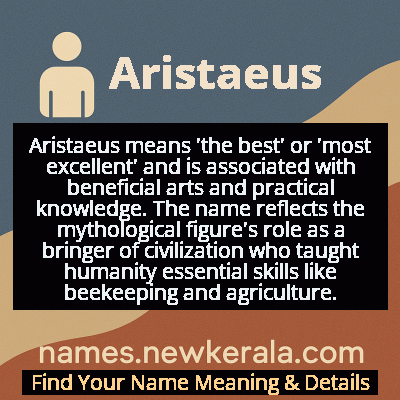Aristaeus Name Meaning & Details
Origin, Popularity, Numerology Analysis & Name Meaning of Aristaeus
Discover the origin, meaning, and cultural significance of the name ARISTAEUS. Delve into its historical roots and explore the lasting impact it has had on communities and traditions.
Name
Aristaeus
Gender
Male
Origin
Greek
Lucky Number
5
Meaning of the Name - Aristaeus
Aristaeus means 'the best' or 'most excellent' and is associated with beneficial arts and practical knowledge. The name reflects the mythological figure's role as a bringer of civilization who taught humanity essential skills like beekeeping and agriculture.
Aristaeus - Complete Numerology Analysis
Your Numerology Number
Based on Pythagorean Numerology System
Ruling Planet
Mercury
Positive Nature
Adventurous, dynamic, curious, and social.
Negative Traits
Restless, impatient, inconsistent, prone to indulgence.
Lucky Colours
Green, white.
Lucky Days
Wednesday.
Lucky Stones
Emerald.
Harmony Numbers
1, 3, 9.
Best Suited Professions
Sales, marketing, travel, entertainment.
What People Like About You
Versatility, charisma, adventurous spirit.
Famous People Named Aristaeus
Aristaeus of Marmora
Ancient Greek Scholar
Early geographer and natural philosopher who wrote extensively on navigation and Mediterranean geography
Aristaeus the Elder
Mathematician
Pythagorean mathematician known for his work on mean proportions and mathematical theory
Aristaeus of Croton
Physician
Early Greek physician and student of Hippocrates who contributed to medical theory
Name Variations & International Equivalents
Click on blue names to explore their detailed meanings. Gray names with will be available soon.
Cultural & Historical Significance
In regional cults, particularly in Boeotia and Thessaly, Aristaeus was worshipped as an agricultural deity who ensured the prosperity of the land and taught humans how to live in harmony with their environment. His connection to both the wild (as a hunter) and the cultivated (as an agricultural expert) made him a bridge between humanity's primal past and civilized future. The cultural legacy of Aristaeus extends beyond mythology into practical arts, where his name became synonymous with the beneficial application of knowledge to improve human life, embodying the Greek value of sophia (wisdom) combined with practical techne (skill).
Extended Personality Analysis
Individuals named Aristaeus are typically perceived as intelligent, innovative, and resourceful, reflecting the mythological figure's role as a bringer of practical knowledge. They often exhibit strong problem-solving abilities and a natural curiosity about how things work, combined with a practical mindset that seeks to apply knowledge for tangible benefits. Like their namesake who mastered multiple arts from beekeeping to medicine, they tend to be versatile and adaptable, capable of excelling in diverse fields. There's often an environmental consciousness or connection to nature inherent in their character, mirroring Aristaeus's role as an agricultural deity and protector of rural arts.
They typically demonstrate resilience and the ability to learn from failures, embodying the mythological theme of redemption and growth through experience. Their leadership style tends to be more about teaching and empowering others rather than commanding, reflecting the cultural hero aspect of the original myth. People with this name often show a balanced temperament—combining the intellectual curiosity of their Apollonian heritage with the earthy practicality of their agricultural associations. They tend to be patient, methodical workers who understand that meaningful results often require time and careful cultivation, much like the agricultural processes their namesake presided over.
Modern Usage & Popularity
In contemporary times, Aristaeus remains an exceptionally rare given name, primarily used by families with strong connections to classical education, Greek heritage, or particular interest in mythology. Its usage is almost exclusively limited to Greece and diaspora communities, where it appears occasionally as a traditional name honoring cultural heritage. The name has seen minimal adoption in English-speaking countries, where its length and classical nature make it challenging for everyday use. However, it occasionally appears in academic circles, among classicists, or as a distinctive middle name choice for parents seeking a name with deep mythological roots. There are no significant popularity trends to note, as the name maintains a consistent but extremely low usage rate, typically chosen for its unique character and intellectual connotations rather than following naming fashions.
Symbolic & Spiritual Meanings
Aristaeus symbolizes the bridge between humanity and nature, representing the ideal of civilized knowledge applied to natural processes. The name carries connotations of beneficial innovation, environmental stewardship, and practical wisdom gained through experience. It embodies the concept of redemption and learning from mistakes, as seen in the mythological figure's journey after causing Eurydice's death. Symbolically, it represents the harmony between cultivation and wilderness, between human ingenuity and natural cycles. The name also carries the symbolism of mentorship and cultural transmission, as Aristaeus was credited with teaching essential survival skills to humanity. It suggests a personality that transforms raw potential into practical benefit, much like the mythological figure who turned wild bees into managed hives and wild olives into cultivated groves.

